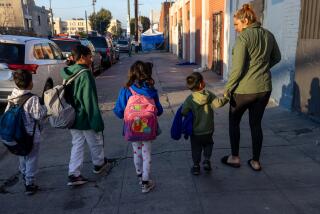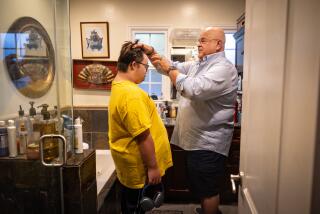Doubled Spending for AIDS Victims Wins Backing of City Council Panel
A San Diego City Council committee Wednesday agreed to double city spending on social services for AIDS victims, approving a proposal that would increase the budget for those services to $300,000 in fiscal year 1989.
Leaders of the three agencies that currently divide $150,000 in city funding hailed the 3-0 vote of the council’s Public Services and Safety Committee as progress on an issue that bitterly divided the council as recently as last month.
“It’s definitely going to help,” said Terry Cunningham, executive director of the AIDS Assistance Fund, which provides food and shelter to AIDS victims. “It’s a positive step in the right direction.”
But the $150,000 won’t go far. The three agencies--the AIDS Assistance Fund, the San Diego AIDS Project and the Center for Social Services--estimate their 1988-89 budgets at $600,000, $700,000 and $250,000 respectively. Other social service agencies will also be allowed to apply for the funds.
11 Projects Share Funds
In other action, the committee divided nearly $1.1 million in unanticipated federal Community Development Block Grant funds among 11 projects, devoting the largest portions to the Logan Heights Family Health Center, work on the Memorial Recreation Center on Ocean View Boulevard, and the city’s social service budget deficit.
Other human service providers were not as lucky. In a separate look at the city’s social services budget for next year, the committee rejected a funding request from the California Center on Victimology and postponed decisions on the YMCA Family Options program, Info Line, The Regional Task Force on the Homeless, Crime Stoppers, Casa Familiar social service agency and a radio reading program for the blind.
Committee members also temporarily spared the Legal Aid Society of San Diego a $6,784 cut in city funding.
Wednesday’s committee meeting provided a contrast to Tuesday’s full council session, when council members tossed around price tags ranging from $1.5 billion to $2.4 billion for a new federally mandated sewage treatment program that the city will have to install.
Relatively Tiny Sums
Wednesday, advocates for the homeless, crime victims, AIDS victims and the blind pleaded for relatively tiny sums: $2,550 for the Regional Task Force on the Homeless; $25,000 for the Crime Stoppers anonymous tip telephone line; $45,000 for a YMCA program providing counseling, and emergency shelter to teens in crisis.
As council members passed around a submachine gun recovered through a tip to Crime Stoppers, Dan Mitrovich, a member of the organization’s board of directors, told them that “without Crime Stoppers, this could still be out there in this community and you could be the next victim.”
Legal Aid Society Chief Counsel Gregory Knoll told the panel that his organization “averages 474 new pleas for help every day. We have seven people who do nothing but screen them to make sure” they qualify for aid.
While the council will have to find a way to fund the sewage treatment project, most of the social service needs were put on the list of “unfunded” needs that the council will take up when it begins its fiscal 1989 budget deliberations next month.
“As always,” Councilwoman Judy McCarty said, “we want to add more (programs) than we take off.”
The AIDS funding issue ignited a bitter three-month battle when council members Ed Struiksman, Bob Filner and Wes Pratt in January called for a $250,000 emergency contribution of city aid and $500,000 more to be added to the 1989 budget. Mayor Maureen O’Connor fought the three, saying that the AIDS funding decision should be made during regular budget deliberations on other programs.
On March 2, the council’s Public Services and Safety Committee gave O’Connor a victory by refusing to consider the council members’ request.
The full council must still approve the funding increase voted by the committee Wednesday.
More to Read
Sign up for Essential California
The most important California stories and recommendations in your inbox every morning.
You may occasionally receive promotional content from the Los Angeles Times.










